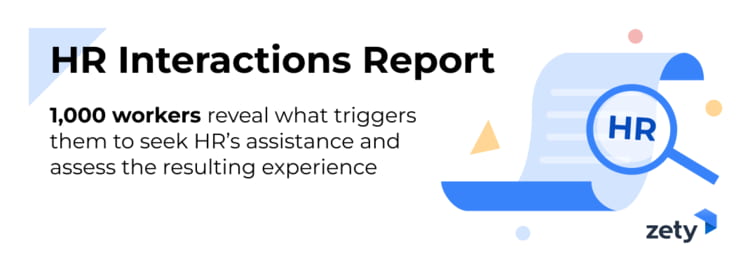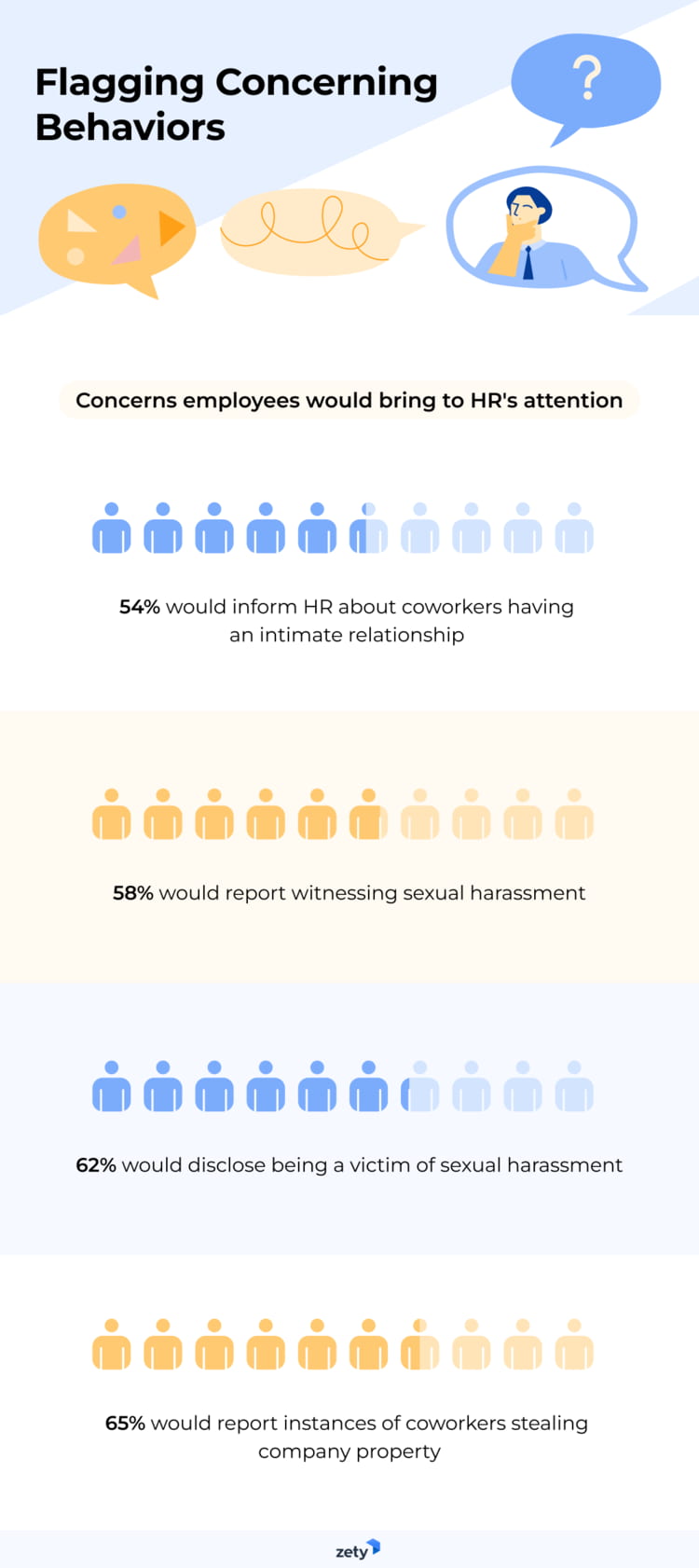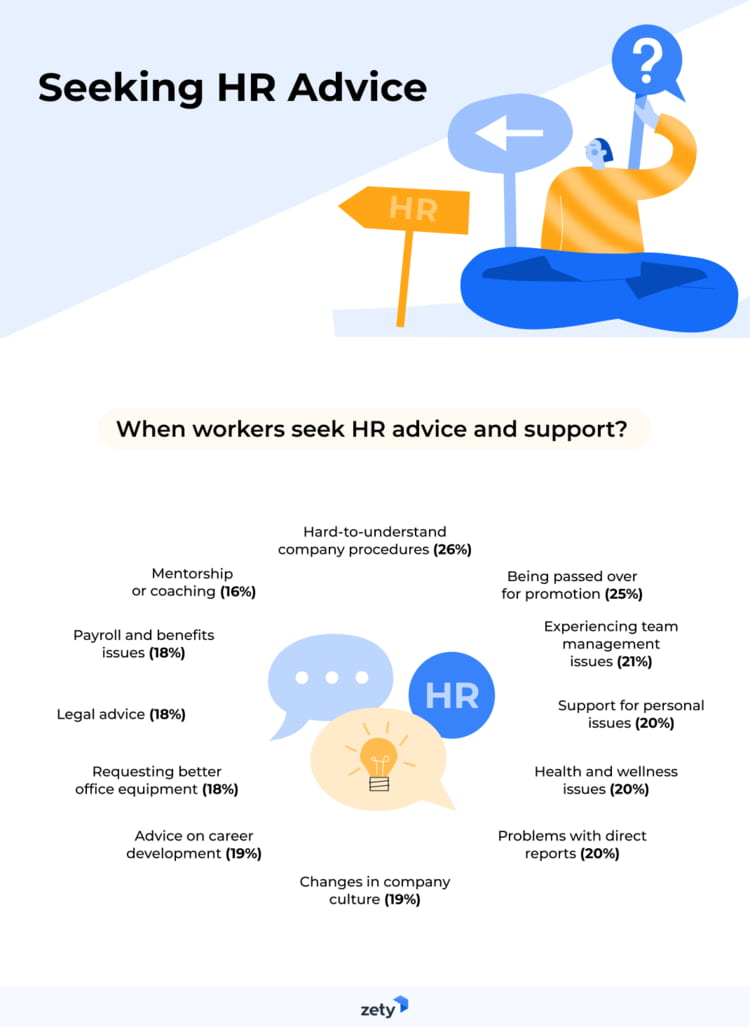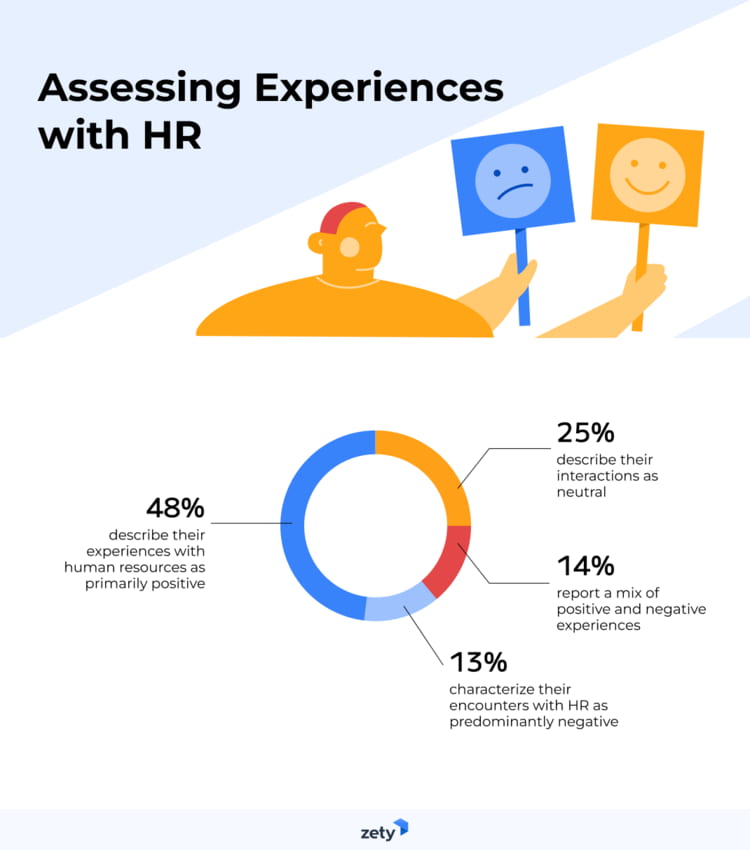HR Interactions Survey Finds 54% of Workers Would Report Colleagues Having an Intimate Relationship
Create Your Resume Now
While speaking up and advocating for a colleague, especially someone who was a victim of workplace harassment, should be standard practice, Zety’s most recent study reveals today’s workforce is hesitant to report such behaviors to HR.
For Zety’s HR Interactions Report, nearly 1,000 American respondents were surveyed to investigate what triggers employees to seek HR’s assistance, discover areas where HR’s advice is most valuable, and assess the resulting experience.
The research findings reveal that while the majority feel supported by (87%) and trust (85%) their HR department, much of the workforce doesn’t feel empowered to voice their concerns confidently. For example, 62% of respondents would disclose being a victim of sexual harassment, but 38% would not. 42% also wouldn’t report witnessing the sexual harassment of a colleague, and 43% wouldn’t report witnessing discrimination.
Keep reading to uncover further insights from the HR Interactions Report.
Harassment Reporting by Gender
Gender disparities persist in the workplace, particularly when it comes to reporting hostile acts. Despite efforts to promote equality and foster safe environments, a significant portion of both women and men hesitate to report such instances:
- 44% of women and 32% of men wouldn’t report being a victim of sexual harassment.
- 40% of women and 45% of men wouldn’t report witnessing sexual harassment in the workplace.
- 41% of women and 44% of men wouldn’t report witnessing discrimination.
These hesitations can stem from various factors, including fear of retaliation, disbelief in the effectiveness of reporting mechanisms, or concerns about damaging one's reputation. Understanding and addressing these barriers is essential for creating workplaces where everyone feels empowered to speak up against misconduct.
Issues Reported to HR
Employees still struggle to act on hostile situations that require HR involvement. However, many are willing to bring other concerning behaviors to HR’s attention:
- 65% would report instances of coworkers stealing company property.
- 62% would report coworkers avoiding work.
- 62% would report coworkers threatening others or engaging in physical violence.
- 62% would report witnessing vandalism.
- 61% would expose witnessing fraud.
- 60% would report coworkers wearing inappropriate clothes.
- 60% would report coworkers regularly handling private issues while at work.
- 58% would reveal coworkers coming in drunk or under the influence of drugs.
- 54% would report coworkers having an intimate relationship.

The majority of survey respondents also see HR as an important resource for dealing with and resolving interpersonal conflict, whether it be with a manager or coworker.
- 65% would report to HR interpersonal challenges with managers.
- 58% would report interpersonal challenges with coworkers.
Today’s workforce is also open to sharing when they are dealing with a personal challenge, especially on issues that may carry over and impact performance at work.
- 64% would report the death of a relative.
- 58% would report their mental health or well-being issues.
- 54% would report their divorce.
Zety's report also explored the role HR plays when employees need professional support. The findings reveal that human resources departments often serve as the main point of contact.
- Nearly half (48%) seek human resources support when encountering problems at work.
- Conversely, only one-fourth (26%) opt to approach their manager or boss, with an equal proportion (26%) seeking a colleague’s advice.
Reasons for Interactions with HR
HR's role does not end with addressing alarming situations and solving employees' problems.
Additional report findings indicate that people value working with HR for career support, mentoring and guidance.
- 95% used HR's services for performance evaluations, feedback, or goal-setting, including:
- 54% worked with HR for feedback and performance evaluations at least once.
- 41% of workers reported using HR for support on performance evaluations, feedback, or goal-setting more than once.
Workers are also likely to seek HR advice when figuring out hard-to-understand company procedures (26%), being passed over for promotion (25%), or experiencing team management issues (21%). Other instances when people turn to HR for advice include:
- Support for personal issues (20%)
- Health and wellness issues (20%)
- Problems with direct reports (20%)
- Changes in company culture (19%)
- Advice on career development (19%)
- Requesting better office equipment (18%)
- Legal advice (18%)
- Payroll and benefits issues (18%)
- Mentorship or coaching (16%)

Experiences with HR
The HR Interactions Report sheds light not only on why employees engage with HR but also explores how, assessing the resulting experiences from these interactions.
While there are a lot of promising results from the survey, slightly less than half describe their experiences with HR as primarily positive, showing there’s still room for HR departments to improve their relationship with employees.
- 48% describe their experiences with human resources as primarily positive, while:
- 25% describe their interactions as neutral.
- 14% report a mix of positive and negative experiences.
- 13% characterize their encounters with HR as predominantly negative.

While HR undoubtedly fulfills many functions effectively and receives positive feedback, it's essential to recognize that there are serious gaps that need to be addressed. As the survey data suggests, there are areas where HR needs to enhance their practices and processes to better serve employees and the organization.
